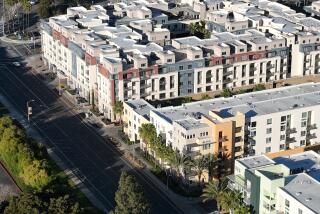Bradley Plan on Low-Rent Housing Hit as Inadequate
- Share via
Los Angeles Mayor Tom Bradley, criticized by affluent homeowners favoring slow growth, is now under fire from some representatives of the poor who oppose his plan to build low-rent housing.
Leaders of nine organizations, joining in a coalition called Campaign for Critical Needs, are circulating pamphlets in English and Spanish promoting a public meeting at a union hall near downtown on Saturday to attack the plan as inadequate.
Their target is the mayor’s proposal, announced earlier this year, to increase greatly property taxes from the huge downtown redevelopment project and use more than half the proceeds to finance housing for low-income people and for an after-school care program. The coalition objects to the amount of money allocated to housing and to the process of distributing it.
Opposition View
Charging that the mayor would spend the money on “expensive condos, high-rises and shopping malls,” the opponents called for using the funds for more child-care centers, services for the homeless, affordable housing, trauma centers, hospitals, senior citizen centers and for improved education.
But John J. Tuite, administrator of the city Community Redevelopment Agency, said the Bradley plan “is a balanced program that will meet low-cost housing needs” while providing money to rebuild decaying downtown areas, such as the old Spring Street financial district.
The emergence of the opposition might pose a political problem for the mayor, who is trying to invigorate his own coalition for his fifth-term reelection bid next year against the expected challenge of City Councilman Zev Yaroslavsky.
Over the years, the Bradley coalition has been a mixture of downtown business leaders who applaud his support of redevelopment, and affluent liberals and poorer residents who are bound by an affection for the mayor. But heavy criticism developed among upscale Westside and San Fernando Valley Democrats, who oppose growth, over Bradley’s development policies. If criticism of his housing plan catches on in poorer areas hit by residential demolitions, poor maintenance by slumlords and rising rents, Bradley would be forced to defend himself on two flanks.
Major Change Proposed
At first, the housing plan appeared to appeal to downtown business interests and the poor, while not particularly offending the anti-growth liberals, who have not fought downtown redevelopment.
The mayor proposed a major change in the way the city uses property taxes generated through the redevelopment agency. The agency condemns run-down or old buildings, sells the property to high-rise developers and then benefits from the big increase in property taxes generated by the new construction.
At present, only $750 million of the additional tax revenues can be used by the redevelopment agency, with the rest going to other city uses, county government and the Los Angeles Unified School District. Bradley proposed that the limit be raised to $5 billion. Of that, $2.12 billion would go for housing and homeless services, more than $200 million for an after-school care program and up to $1.5 billion for streets, street lights and other facilities needed for expansion of downtown redevelopment.
Deputy Mayor Mike Gage, Bradley’s top aide, and Bradley’s counsel, Mark Fabiani, took charge of the project. Obviously aware of the long-standing charge that the redevelopment agency was inept at dealing with the public, the mayor’s office prodded the agency into hiring the Center for Law in the Public Interest to help deal with community leaders who might oppose the plan.
“Mike has shaken things up,” Carlyle Hall of the law center said of the redevelopment agency. “And Mark has Mike’s ear.”
But despite the mayor’s efforts, the coalition for the poor clearly is not satisfied.
In an interview Monday, six coalition representatives told The Times what would be discussed Saturday at the Amalgamated Clothing and Textile Workers Union Hall at 2501 S. Hill St. They said that they:
- Oppose having the redevelopment agency in charge of building low-cost housing and providing social services. “This is not a housing agency,” said attorney Charles Elsesser of Legal Aid. He and others said that the redevelopment agency, run by a board appointed by the mayor and City Council, would not be as responsive to constituents as elected officials.
- Charged that not enough of the new property taxes would go for low-income housing and social services and too much would be spent for high-rent, high-rise residential projects, such as the redevelopment agency’s downtown South Park project around 10th and Flower streets.
- Objected to the redevelopment agency’s use of the new property tax revenue for facilities such as street lights and other improvements for downtown. Developers should pay for them, not taxpayers, they said.
Gary Blasi, a Legal Aid attorney, said that the downtown business, having benefited from the city redevelopment plan since 1975, should now contribute more for housing, education and social services.
“This is not a depressed area any more,” he said. “They said there would be this wonderful payoff. Now is the time. Now is the time for the golden goose to kick out some of its eggs.”
Gage said the redevelopment agency is the best agency to handle the difficult housing job. One reason, he said, is that developers feel “you can do business with them.”
Another reason, he said, is that redevelopment funds are excluded from the so-called Gann Limit that restricts the amount that local and state governments can spend.
He said that the county, the city and the school district could not spend much of any new redevelopment property taxes for housing and social services because they are approaching the Gann limit.
The coalition representatives are the second opponents of the Bradley plan to emerge. Richard B. Dixon, Los Angeles County’s chief administrative officer, also has criticized it because he said it would deprive the county, the city and the school district of the redevelopment revenues.
More to Read
Sign up for Essential California
The most important California stories and recommendations in your inbox every morning.
You may occasionally receive promotional content from the Los Angeles Times.










